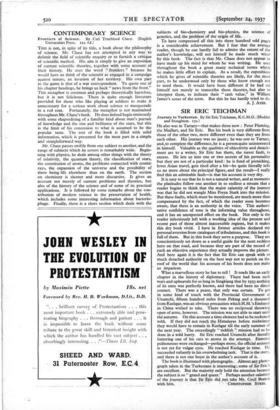CONTEMPORARY SCIENCE
THIS is not, in spite of its title, a book about the philosophy of science. Mr. Chase has not attempted in any way to delimit the field of scientific enquiry or to furnish a critique of scientific method. His aim is simply to give an exposition of current scientific theories, together with some account of their history. He uses the word " frontiers " because he would have us think of the scientist as engaged in a campaign against nature, an invasion of her territory. His own part in the game is that of a war correspondent. To quote one of his chapter headings, he brings us back " news from the front." This metaphor is common and perhaps theoretically harmless, but it is not felicitous. There is quite enough literature provided for those who like playing at soldiers to make it unnecessary for a serious work about science to masquerade in a red coat. Fortunately, the metaphor is not maintained throughout Mr. Chase's book. He does indeed begin ominously with some rhapsodising of a familiar kind about man's pursuit of knowledge and the size and brilliance of the stars, but this is the limit of his concession to what is assumed to be the popular taste. The rest of the book is filled with solid information, which is presented for the most part in a simple and straightforward way.
Mr. Chase passes swiftly from one subject to another, and the range of subjects which he covers is remarkably wide. Begin- ning with physics, he deals among other things with the theory of relativity, the quantum theory, the classification of stars, the constitution of atoms, the problems connected with cosmic rays, the expansion of the universe and the possibility of there being life elsewhere than on the earth. The section on chemistry is shorter and more discursive. It gives an account not merely of current problems and theories, but also of the history of the science and of some of its practical applications. It is followed by some remarks about the con- tribution of modern science to the preservation of health, which includes some interesting information about bacterio- phage. Finally, there is a short section which deals with the
subjects of bio-chemistry and bio-physics, the science of genetics, and. the problem of the origin of life.
To have compressed all this into three hundred odd pages is a considerable achievement. But I fear that the average reader, though he can hardly fail to admire the extent of the author's knowledge, will not himself be made much wiser by this book. The fact is that Mr. Chase does not appear to have made up his mind for whom he was writing. He uses throughout the book a great many technical terms which he makes little effort to explain. As a result, the expositions which he gives of scientific theories are likely, for the most part, to be understood only by those who know enough not to need them. It would have been different if he had set himself not merely to transcribe these theories, but also to interpret them, to indicate their " cash value," in William James's sense of the term. But this he has hardly tried to do.
A. J. AYER.


















































 Previous page
Previous page